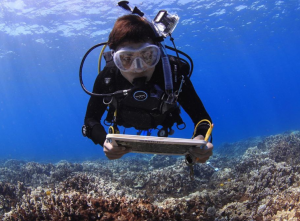Hometown: Takoma Park, MD
Lab: Dr. Jennifer Smith’s Lab, Scripps Institution of Oceanography
Lab website: https://scripps.ucsd.edu/labs/coralreefecology/
Hobbies: Pottery, SCUBA diving, hiking, cooking
What do you study? I use virtual reality to study coral reefs. We visit coral reefs around the world and take thousands of underwater pictures of each reef. When we get back on land, we use a technology called “Structure from Motion” to stitch those photos together into a 3D model of the reef. These models allow us to study how reefs grow and change over time, and allow us to identify the necessary ingredients for a healthy coral reef.
Why is it important? Coral reefs support so much life in the ocean – we think that up to one in four marine species live on coral reefs. The fish that live on coral reefs also feed millions of people around the world, and the corals that build reefs help to protect coastlines from big waves. However, corals thrive within a narrow range of temperatures – when the water gets too hot, corals can die. For that reason, we are concerned that climate change will damage our reefs, harming the animals and people that depend on them.
How did you become interested in science? I first became interested in studying animals and the natural world after visiting my local zoo and aquarium as a child, and decided that I wanted to get into marine science after snorkeling on family vacations. I’ve always wanted to work in a field where I could make a difference in the world, and feel that I can do that as a scientist by researching how the natural world is changing.
What do you like about being a scientist? Working in marine biology, one of the major perks is getting to do field work in cool places. I have gotten to travel to the Great Barrier Reef, to Hawaii, and even to the Aleutian Islands in Alaska, all in the name of field work. But 95% of my job occurs back on land when I analyze data, come up with research questions, and learn new things. One of the most exciting parts of being a scientist is getting to discover things that no one else in the world has discovered yet.
What are 5 general vocabulary terms someone should know going into your field of science?
Coral, macroalgae, bleaching, ecology, biodiversity
What are 5 specific vocabulary terms someone should know about your research?
Rugosity, structural complexity, community composition, Structure from Motion, resilience
Sneak peek!

